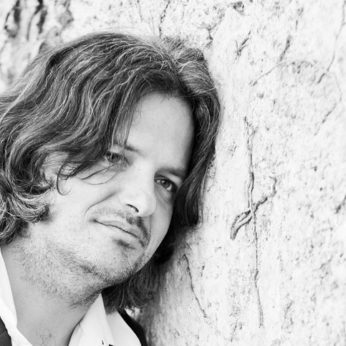Composer: Osvaldo Golijov (b. 1960)
Performance date: 05/07/2019
Venue: Bantry Library
Composition Year: 1994
Duration: 00:39:22
Recording Engineer: Ciaran Cullen, RTÉ
Instrumentation: 2vn, va, vc
Instrumentation Category:Clarinet Quintet
Instrumentation Other: cl, 2vn, va, vc
Artists:
Mate Bekavac -
[clarinet]
Dahlkvist Quartet (Alexander Kagan [violin], Kersti Gräntz [violin], Jon Dahlkvist [viola], Hanna Dahlkvist [cello]) -
[quartet]

Osvaldo Golijov [born 1960]
The Dreams and Prayers of Isaac the Blind [1994]
Prelude: Calmo, sospeso
I Agitato – Con fuoco – Maestoso – Senza misura, oscillante
II Teneramente – Ruvido – Presto
III Calmo, sospeso – Allegro pesante
Postlude: Lento, liberamente
As he describes below, Golijov’s intention in this piece is to fuse thematic elements of the Jewish klezmer tradition with the form of the string quartet as found in Brahms and Mozart. The clarinettist takes on the role of roaring biblical prophet in the savage, uncanny sonorities of the Aramaic Prelude and first movement, playing B flat, A and bass clarinets. In the second movement, a Yiddish klezmer dance like no other is created using the C-clarinet while the quartet pumps and stomps for dear life. The third section takes on the aspect of a Hebrew prayer with the bass-clarinet prominent, leading to something like a rabbinical blessing at the end. All this demands extraordinary concentration and physical effort from the clarinet player, who is required to maintain a controlled fusion of styles on four different instruments, while leading the klezmer band in an explosive performance of this remarkable score, which is played without a break.
Golijov himself describes his work in more temperate tones: Eight centuries ago Isaac The Blind, the great kabbalist rabbi of Provence, dictated a manuscript in which he asserted that all things and events in the universe are the product of combinations of the Hebrew alphabet’s letters. Isaac’s lifelong devotion to his art is as striking as that of string quartets and klezmer musicians. In their search for something that arises from tangible elements but transcends them, they are all reaching a state of communion. If communion is not the reason, how else would one explain the strange life that Isaac led, or the decades during which groups of four souls dissolve their individuality into single, higher organisms, called string quartets? How would one explain the chain of klezmer generations that, while blessing births, weddings, and burials, were trying to discover the melody that could be set free from itself and become only air, spirit, ruakh?
The movements of this work sound to me as if written in three of the different languages spoken by the Jewish people throughout our history. This somehow reflects the composition’s epic nature. I hear the prelude and the first movement, the most ancient, in Arameic; the second movement is in Yiddish, the rich and fragile language of a long exile; the third movement and postlude are in sacred Hebrew.
But blindness is as important in this work as dreaming and praying. I had always the intuition that, in order to achieve the highest possible intensity in a performance, musicians should play, metaphorically speaking, ‘blind’. That is why, I think, all legendary bards in cultures around the world, starting with Homer, are said to be blind. ‘Blindness’ is probably the secret of great string quartets, those who don’t need their eyes to communicate among them, with the music, or the audience. My homage to all of them and Isaac of Provence is this work for blind musicians, so they can play it by heart. Blindness, then, reminded me of how to compose music as it was in the beginning: An art that springs from and relies on our ability to sing and hear, with the power to build castles of sound in our memories.
Osvaldo Golijov
Copyright © 2024 West Cork Music. All rights reserved.
Designed and developed by Matrix Internet